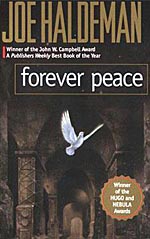
![]() bazhsw
bazhsw
4/7/2015
![]()
SPOILERS IN REVIEW
I read The Forever War last year and really enjoyed it, probably one of my favourite books last year so I recently picked it up. I was a little disappointed to realise it wasn't a sequel from the first book except on a thematic level. That said, it seemed a book that would continue to explore the futility of war.
The novels main protagonist Julian Class is a part time soldier / part time physics teacher. He fights in 'soldierboys' which are heavily armoured humanoid constructs with enough weaponry to level cities. The 'soldierboys' are controlled remotely via a neural pathway and through said pathways other operators (called 'mechanics' in the novel) can communicate with others in their unit. This neural connection is known as 'jacking' and comprises of cables stuck in the back of one's neck. Evidently in 2043 WiFi isn't that popular...
What this means is each connected member can feel the others thoughts, empathise with them, know their darkest secrets and desires, how they truly feel. In essence, they can share each others minds.
The war is essentially between The Alliance (broadly speaking the West today) and the Ngumi, a coalition of disparate groups fighting the Alliance (essentially the developing world). The war is presented as the Alliance fighting Ngumi barbarity and the impact of the soldierboys is that they are a virtually unstoppable force. Straight away, an early question is asked in that if the soldierboys are so devastating why does there continue to be more rebels continuing the war if they can be subjugated so easily - clearly the rebels have more to lose (indeed, it is noted that in many Ngumi countries there is a government that doesn't support the people whereas the Ngumi get support. It is essentially a resource war of those of the haves and the have-nots. I quite liked how Haldeman handled this from the perspective of Class - he 'knows' the Alliance isn't perfect but the conflict is presented through the Alliance lens. There isn't a turnaround in 'Ngumi=good', rather it is the human impact of death that is explored.
There is a race element in the book as Class is black and is romantically involved with an older white woman. I'm not sure this characterisation was necessary. I would have hoped in an effectively socialised West in 2043 inter-racial relationships wouldn't be a big deal.
The second half of the novel changes tack as scientists learn two things - one, due to a project in space trying to capture energy from recreating the conditions of the Big Bang the Universe is weeks away from destruction and secondly, persons jacked for longer periods of time empathise to such a degree they are humanised and no longer have the capacity to harm another human being, except in self defence. Persons share each others emotions and perspective and in effect can't harm 'their selves'. What is interesting for me is clearly this empathy isn't extended to animals as they all tuck into meat dishes in restaurants whilst being humanised. If the capacity to cause pain and suffering is removed surely this would effect non-human animals also?
Thus leads to the plan to humanise everyone. Except in many cases it doesn't work or even kills people. Except it removes the choice of being humanised from people. There is even a solution of a 'leper colony' for people who can't be humanised which reeks of fascism - putting those with capacity for violence in their own society. The parallels with social engineering throughout history are here. Thinking about the issues I would love to be humanised but would resist the conscription. It's all good and well sharing thoughts and perspective but no one would be truly private ever again. We'd be one peaceful hive mind.
There is a plot thread which is quite exciting but is quite cartoonish of high placed military assassins who are part of a religious 'End of the World' cult who are trying to stop the cult. They are pretty unstoppable and does leave one questioning the role violence plays.
My only real criticism is that at times the writing is a little clunky and it's quite hard to care about the characters. There are a lot of themes in the book, probably enough for a couple of books. I am left with the possibility that permanent peace is appealing yet also quite frightening.